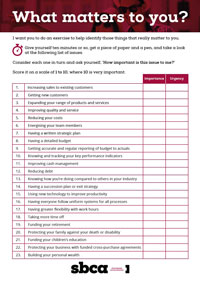‘What matters to you, really matters.’ You might be looking at that and wondering what on earth it means!
Well, let’s see if I can explain.
When you started your business, you no doubt did so for a number of reasons. I know I did. And we’re all different, so we all have slightly different reasons.
However, there are some main ones that pretty much apply to all of us, no matter what sort of business we have or how big it is, including:
- You want to provide for your family, to make sure they’re secure and have a good standard of living.
- You want to be your own boss, to have control of your own destiny.
- You want to make money, to benefit fully and directly from the wealth your hard work, skills and knowledge generates.
- You want flexibility, to be in a position to make your own decisions and plans.
- You want the chance to build equity, and at a better level than you could with a fixed income, the value of which is dictated by someone else.
- I’m betting at least some of those are familiar to you. And here’s the thing; as well as being personal reasons for setting up in business, the drivers that got the idea out of your head and into the world, those are fledgling business objectives.
If you base your business objectives on the things that matter to you, there is a greater chance you will achieve them. Focusing on key issues helps drive success.
What matters to you?
I want you to do an exercise to help identify those things that really matter to you. Give yourself ten minutes or so, get a piece of paper and a pen, and take a look at the following list of issues.
Consider each one in turn and ask yourself, ‘How important is this issue to me?’
Score it on a scale of 1 to 10, where 10 is very important.
- Increasing sales to existing customers
- Getting new customers
- Expanding your range of products and services
- Improving quality and service
- Reducing your costs
- Energising your team members
- Having a written strategic plan
- Having a detailed budget
- Getting accurate and regular reporting of budget to actuals
- Knowing and tracking your key performance indicators
- Improving cash management
- Reducing debt
- Knowing how you’re doing compared to others in your industry
- Having a succession plan or exit strategy
- Using new technology to improve productivity
- Having everyone follow uniform systems for all processes
- Having greater flexibility with work hours
- Taking more time off
- Funding your retirement
- Protecting your family against your death or disability
- Funding your children’s education
- Protecting your business with funded cross-purchase agreements
- Building your personal wealth

Once you’ve worked through the list, look back over your scores and see if anything should be rated differently. It could be that what you thought was an 8, say, at the outset, is now more realistically a 6, because you’ve had a chance to consider everything on the list and to see each in context. Make any necessary adjustments.
If you want to add another layer to this process, you can also score out of 10 how urgent each of these is. That can help you to prioritise. For example, if you rated something as 10 for importance, but it’s only a 6 when it comes to urgency, and you have something else that you rated as 8 for importance, but it’s a 10 for urgency, you do the second one first! Something that rates as a 1 or 2 on both assessments probably isn’t really an issue. If you ever get to the stage where everything else has been dealt with, you can tackle it then.
Now what?
Okay, so whether you looked at importance only, or importance and urgency, you should now be in a position to prioritise your personal objectives and set actions for business improvement.
Put them in order of importance and add some detail – for example, increasing sales to existing customers by £X over three months. That makes an issue into an objective, and you can measure how successful you are at achieving it.
The most profitable small businesses all have one thing in common: the owners’ personal objectives are congruent with their business strategies. It’s this congruence that gives meaning to action and helps to drive things forward. Because what matters to you personally, really matters to your business.
Making it happen
In this exercise we’ve established your core personal and business objectives. But here’s the thing – without a plan, you’re not going to be able to achieve them. It’s like setting off on a journey with the satnav locked in the glovebox – or the wrong postcode keyed in.
Need help getting going? You’d be surprised how much we know and what a difference some advice and guidance can make! Get in touch to talk things through – we’ll be happy to explain how we can help.
